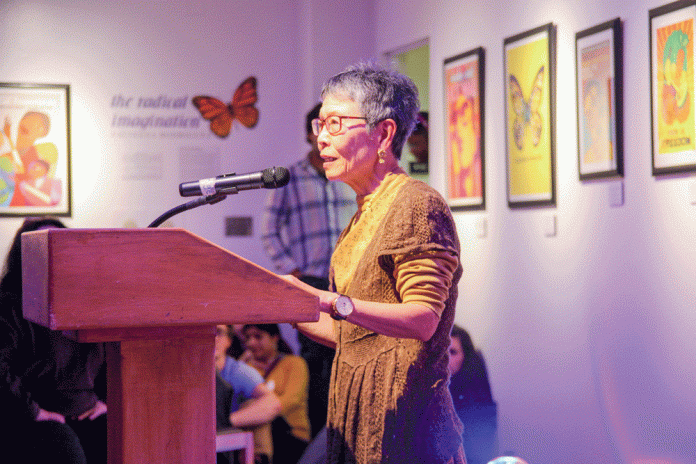Michael Lin
Staff Writer
To calm yourself over recent political crises, either grab a bucket of ice cream or pick up your pen for some artistic expression. This Thursday, renowned poets Rick Benjamin and Shirley Geok-Lin Lim voiced their concerns at the UCSB Multicultural Center, as they mustered all their allegories, similes, metaphors, and literary devices to make sense of what’s happening today.
One might think something seemingly dead on paper like literature cannot have significant impact on society as a whole — or at least, not until the poem has been around for a long time. Contemporary poets and poets-to-be would like to prove the world wrong. As Benjamin points out, “we are living in this time where truth matters so little, and intellectual and emotional depth matters so little. And so, what we can do with this medium [poetry] means so much.”
For an example, Lim read one of her poems that criticizes female infanticide in China. She talked about how her poem eventually caught the attention of People’s Daily of Beijing and stirred up conversation around the topic. Hence, Lim shows a poet can actually play a strong role in society and public policy today.
Benjamin suggests that writing, studying, and reading poetry can bolster people’s critical thinking and self-reflection, skills that are rarer to come by in this age due to ease of information access. Especially in a time where people need to come together and learn more about the United States of America, history and literature seem to be inseparable. He uses a small anecdote to illustrate his point.
At a history conference, a history scholar asked a poet, “What are you doing on this panel? You’re a poet.” The poet answered, “Honey, I can do in thirty lines what it takes you three hundred and fifty pages to say.”
To relate to the present day, Benjamin urges us to look at multiple poets and their poems, many of which have already addressed similar problems like racial and class tension. Some of these poems included Langston Hughes’s “Let America be America Again” and Marie Curie’s “Power.” Moreover, poems that depicted a Red Scare, Cold War-like period in a more recent light were also used to refine his intention to illustrate how many times we have already gone through similar problems in our history.
Both Lim and Benjamin hoped to embody the idea of resilient love in a time of hate. One of the poem that utilizes this idea was Lim’s poem “Learning to Love America.” As Lim read the poem, satisfied nods and murmurs from the whole room signified how the lyrics reminded people of their love for United States of America. It’s where a fiercely diverse (not much has changed in that respect) world came together despite difference, according to Lim, “because I say we rather than they … because countries are in our blood and we bleed them.”
New poems from Benjamin can be found in his works including “Passing Love, Floating World, & Endless Distances.” Lim’s works such as “What the Fortune Teller Didn’t Say” can also be found online. Fortunately, she currently teaches literature and poetry at UCSB. So, if protests seem insane and ice cream appears appetizing, perhaps it’s due time to look inward for a poetic inspiration.











